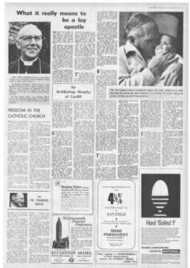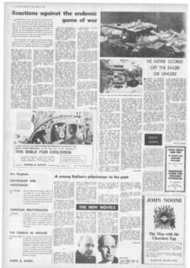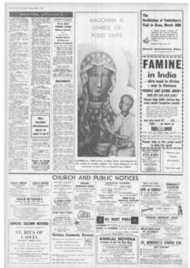Page 2, 6th May 1966
Page 2

Report an error
Noticed an error on this page?If you've noticed an error in this article please click here to report it.
Tags
Share
Related articles
Ukraine Catholics' Glimmer Of Hope
Archbishop Casaroli On U.s. Visit
Three Main Subjects At Rome-canterbury Talks
Monaco's Fall From Grace
Monaco's Fall From Grace
Rome, Wednesday
AN unprecedented Vatican-Soviet Union combined operation lest week provided a classic example of how to transform a "strictly private visit" into a strictly public one.
THE operation? The Russian Foreign Minister, Mr. Alexei Gromyko's call on Pope Paul.
A simple enough manoeuvre on the face of it, and at the same time one of outstanding significance to a world watching anxiously for any and every move towards peace and international understanding.
Yet it demanded one of the heftiest concentrations of police, in uniform and plain clothes, ever seen at one time in or about the Vatican. It was also deemed fitting that the world's press should be deprived of an opportunity to adequately report this event of world importance.
Mr. Gromyko's actual visit to the Vatican climaxed several days of confusion, false reports and speculation about whether, in fact, he would ever make it.
The initiative had to come from him. ("We never invite", as the Vatican always says.) Up until the day before he did see the Pope, Vatican sources were announcing that he had made no application and that by then it was too late.
Mr. Gromyko, apparently did take his time to make up his mind. Then, at the last minute, he took the plunge.
One story supporting doubts that the visit would eventuate was that Mr. Gromyko had decided that, because Poland's Communist government was feuding openly and violently with Cardinal Stefan Wyszynski and the Catholic Church in general, he felt he would be letting down the side if he was to seek a friendly meeting with the supreme head of that church.
Before Mr. Gromyko arrived in Rome, the official Communist newspaper Unita was predicting, in its usual belligerent fashion, that there would be wild pro-Communist demonstrations while he was here and that generally the Russian bigshot would set off fireworks in all directions.
Nothing like this happened at all. Comrade Gromyko himself. I understand, let it be known in that "or else" way the Kremlin espouses, that he was expecting "tranquillity, dignity and respect" to characterise his visit throughout.
NO DETAILS OF TALKS
No details were released of what Pope Paul and Mr. Gromyko discussed during the most private portion of this most public of all private visits. They were together for 45 minutes. We can take it for granted that Vietnam, about which the Pope sent a personal message to Moscow a few months ago. was high on the list of topics, likewise disarmament, non-proliferation of nuclear weapons and the easing of East-West tensions.
We can also assume that Pope Paul, who had previously spoken to Mr. Gromyko during his peace mission to the United Nations last year. made plain to him how far how very far — he is prepared to go in his role of mediator in international disputes. He and Mr. Gromyko may even have laid the groundwork for some future tangible form of Holy See-Moscow liaison.
The important thing about this meeting is that it took place at all. It provided the world with a practical demonstration of goodwill, and willingness to exchange frank views by two followers of vastly different ideologies.
It also emphasised Pope Paul's adherence to the "open door" policy first established by his predecessor, the late Pope John.
In this context. it is worth recalling that after Pope John had launched an appeal for disarmament in September, 1961, Mr. Krushchev, stressing first that he was an atheist, said: "1 must admit, however, that the head of the Catholic Church is hearkening to the voice of reason when he puts governments on their guard against a possible general catastrophe and makes them face the grave responsibilities of world conflict,"
SIMPLE ANZAC SERVICE
The first combined Anzac Day commemoration service ever held in Rome was simple, moving and successful in every way.
For it, Catholics and nonCatholic worshippers gathered in San Silvestro in Capite, Rome's "official" church for English Catholics, to remember the Australian and New Zealand dead of the two world wars.
blog comments powered by Disqus











